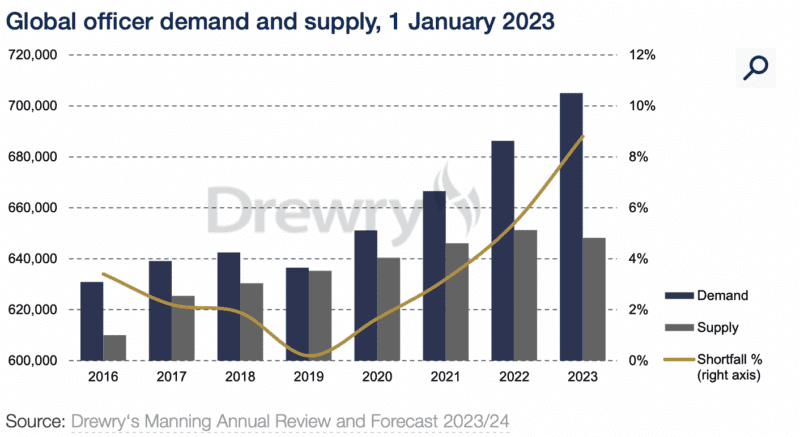Ships Fleeing The Red Sea Now Face Perilous African Weather
By Alex Longley and Paul Burkhardt (Bloomberg) –Ships sailing around the southern tip of Africa are wrestling with a bout of bad weather that has already run one vessel aground and...


Photo: d13 / Shutterstock
The global shipping industry’s severe shortage of ship officers has reached its worst on record and shows signs of abating, according to Drewry’s latest Manning Annual Review and Forecast report released this week.
The report highlights a widening officer availability gap in 2023, reaching a deficit of approximately 9% of the global pool of officers. This marks a significant increase from the previous year’s 5% shortfall and represents the highest level recorded in the 17 years since Drewry began analyzing the seafarer market.


Projections based on the limited availability of new seafarer supply suggest that similar deficit levels will persist from 2023 to 2028. While these projections are based on vessel numbers and assumptions about crewing levels, they serve as a clear indicator of the increasingly tight seafarer labor market. The implications are significant, affecting recruitment and retention efforts as well as manning costs.
The enduring effects of the COVID-19 pandemic continue to impact the industry. Crew training has been substantially affected, and the appeal of working at sea has diminished. Stories of crews enduring prolonged periods on board vessels, often in dire conditions, have contributed to the industry’s dwindling attractiveness.
As a result, the focus on seafarer well-being has gained momentum as a key factor in employee retention eyond wage rates. Elements such as effective communication channels with families back home, comfortable onboard facilities, and a supportive work environment have become increasingly important in attracting and retaining seafarers.
The challenges faced by the seafarer supply chain were further exacerbated by the outbreak of the Russia-Ukraine war. Many experienced crews returned home to join the military, adding to the scarcity of available seafarers. Regrettably, there is currently no end in sight to the ongoing conflict, which means the number of new seafarers from Russia and Ukraine will remain severely limited for the foreseeable future.
While vessel manning will prove to be a considerable challenge in the coming years, particularly with regards to officer availability, the situation will be compounded by the rapid growth of the global deep-sea vessel fleet.
“Employers are exploring alternative sources of supply to address the shortfall, and wages are showing increased volatility,” said Rhett Harris, Head of Manning Research at Drewry. “Sectors such as containerships and offshore supply vessels have already witnessed rising wage rates due to the strength of these sectors. We anticipate that wage costs will accelerate for other vessel types as well.”
Join the gCaptain Club for curated content, insider opinions, and vibrant community discussions.


Join the 107,180 members that receive our newsletter.
Have a news tip? Let us know.
Access exclusive insights, engage in vibrant discussions, and gain perspectives from our CEO.
Sign Up




Maritime and offshore news trusted by our 107,180 members delivered daily straight to your inbox.



Essential news coupled with the finest maritime content sourced from across the globe.
Sign Up